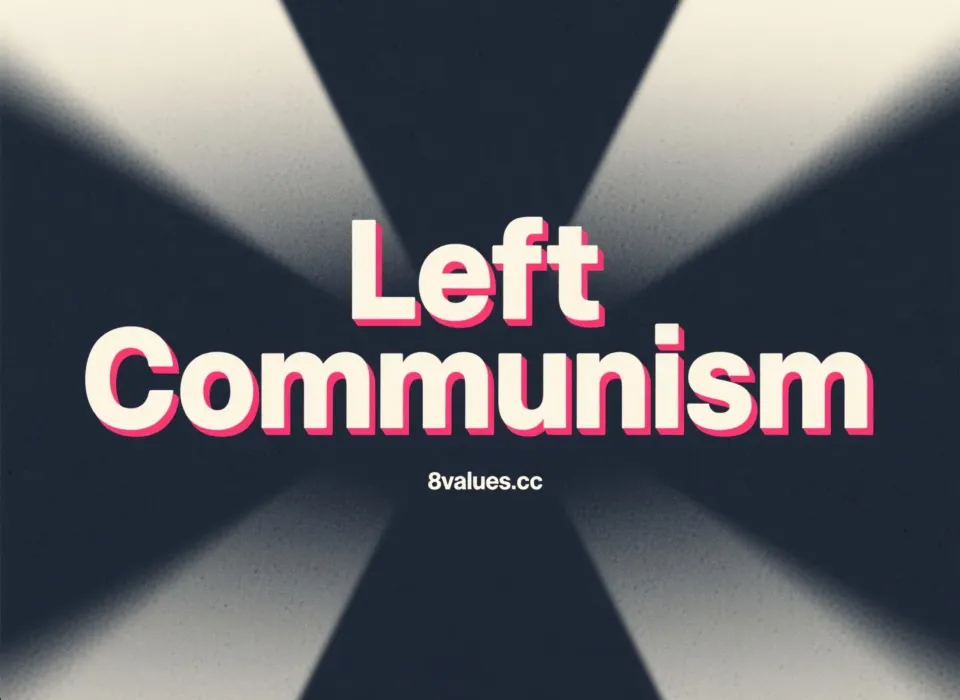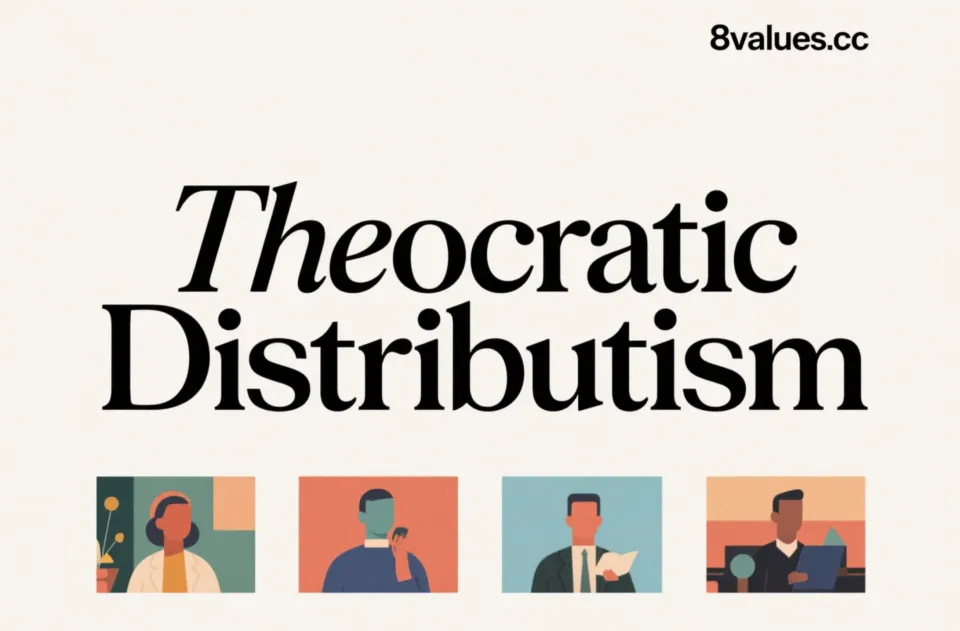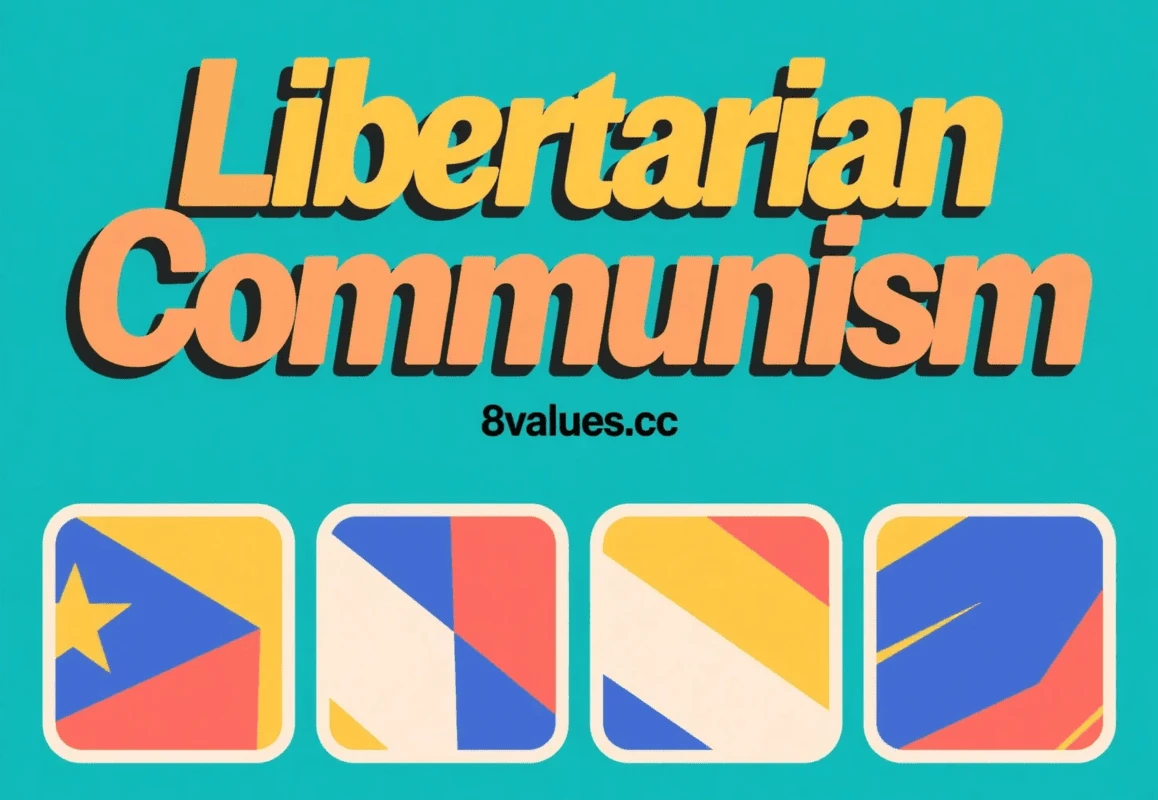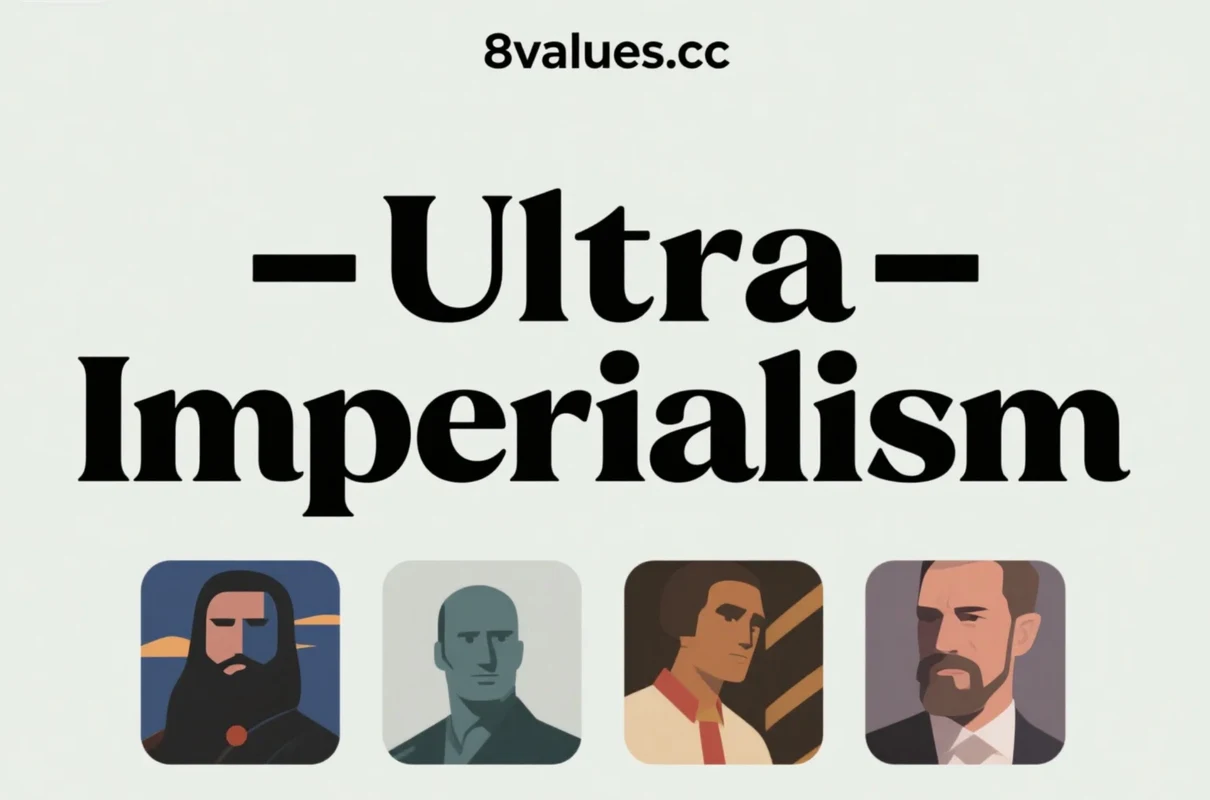Interpretasi Komunisme Kiri: Aliran pemikiran Marxis radikal yang mengkritik Leninisme dan kapitalisme negara
Komunisme Kiri adalah gerakan Marxis radikal yang bermula dari mempertanyakan garis Komunis Internasional pada awal abad ke-20. Ia menganjurkan emansipasi diri kelas pekerja, menentang jalan parlementer dan serikat buruh tradisional, dan mencirikan model Soviet sebagai kapitalisme negara. Memahami tren pemikiran ini akan membantu untuk menganalisis secara mendalam berbagai nilai politik dan tes kecenderungan ideologi, seperti spektrum ideologi yang diungkapkan oleh tes politik 8Values.
Komunisme Kiri, atau komunis kiri, menggambarkan serangkaian posisi yang dipegang oleh komunis kiri yang kritis terhadap pemikiran dan praktik politik yang dianut oleh kaum Marxis-Leninis dan sosial demokrat. Gerakan tersebut bukanlah sebuah organisasi politik yang bersatu, melainkan kumpulan aliran pemikiran dan kelompok. Kelompok komunis sayap kiri bersikeras bahwa mereka menganut pandangan yang "lebih Marxis dan proletar" daripada pandangan Marxis-Leninis yang dianut oleh Komintern setelah Bolshevisasi Joseph Stalin dan selama Kongres Kedua. Mereka umumnya dianggap lebih ke kiri dari spektrum politik dibandingkan faksi sosialis revolusioner lainnya.
Bagi banyak pengguna yang mengeksplorasi spektrum ideologi politik secara mendalam, komunisme sayap kiri mewakili kritik mendalam terhadap praktik arus utama Marxis. Jika Anda tertarik untuk menentukan posisi Anda dalam spektrum kompleks ini, Anda dapat mencoba penilaian diri menggunakan alat seperti Tes Politik 8 Nilai .
Asal usul sejarah dan perbedaan aliran utama Komunisme Kiri
Asal usul teoritis komunisme sayap kiri dapat ditelusuri kembali ke latar belakang sejarah kegagalan sebagian besar revolusi Eropa setelah Perang Dunia I. Ia mencoba mencari cara lain untuk menggantikan model revolusioner yang asli.
Kaum Kiri Awal dalam Konteks Revolusi Rusia
Istilah "komunisme sayap kiri" pertama kali muncul di Soviet Rusia pada tahun 1918. Saat itu, muncul sebuah faksi di dalam Partai Komunis Rusia (Bolshevik), yang menentang Perjanjian Brest-Litovsk yang ditandatangani oleh VI Lenin dan mengeluarkan pernyataan yang mengatasnamakan "Komunis Sayap Kiri" . Mereka menganggap perjanjian itu sebagai pengkhianatan terhadap revolusi internasional. Perwakilan dari faksi ini termasuk Nikolai Bukharin, Mikhail Pokrovsky dan Georgi Pyatakov.
Komunisme sayap kiri telah menjadi rebutan pada periode antar perang mengenai sifat Revolusi Rusia.
Dua Tradisi Inti: Kiri Jerman-Belanda dan Kiri Italia
Sejak Perang Dunia I, komunisme sayap kiri telah berkembang menjadi dua tradisi atau aliran inti:
- Kiri Italia: Juga dikenal sebagai Bordigisme .
- Perwakilan utamanya adalah Amadeo Bordiga, salah satu pendiri Partai Komunis Italia (Partito Comunista Italiano).
- Faksi Bordiga menekankan disiplin ketat dan kemurnian teoritis partai komunis , menganjurkan keberadaan program komunis yang sepenuhnya murni, dan berkomitmen untuk melindunginya dari distorsi.
- Bordiga memaparkan program khasnya pada konferensi pendirian Partai Komunis Italia pada tahun 1921.
- Aliran pemikiran ini lebih menekankan peran partai, bahkan menerima model partai Leninis, dan memandang negara Bolshevik sebagai kediktatoran proletariat.
- Bordiga mengkritik konsep "demokrasi" dan percaya bahwa kediktatoran proletariat harus dikuasai langsung oleh kelas pekerja daripada melalui pemilu atau bentuk parlemen.
- Kiri Belanda-Jerman: Juga dikenal sebagai Dewan Komunisme .
- Perwakilan utama termasuk Antonie Pannekoek , Herman Gorter , Otto Rühle dan Paul Mattick .
- Aliran ini menekankan pada organisasi spontan kelas pekerja , demokrasi akar rumput, dan pembebasan diri.
- Mereka percaya bahwa dewan buruh adalah bentuk organisasi tertinggi dalam revolusi dan bahwa buruh harus mengontrol produksi dan distribusi secara langsung, menentang segala bentuk kepemimpinan partai atau intervensi negara.
- Kaum kiri Jerman dan Belanda percaya bahwa kelas pekerja sendiri adalah subjek komunisme dan menentang teori partai pelopor dan sentralisme demokrasi.
Pengaruh Rosa Luxemburg
Ide-ide Rosa Luxemburg memiliki pengaruh politik dan teoritis yang besar terhadap banyak komunis sayap kiri. Ia menekankan teori revolusi spontan buruh. Meski ia sendiri tidak terlibat langsung dalam pembentukan formal aliran politik ini, tulisannya mempunyai pengaruh besar terhadap komunisme sayap kiri. Beberapa komentator percaya bahwa Luksemburg mempunyai pengaruh terhadap tradisi ini, tetapi Luksemburg sendiri tidak boleh dianggap sebagai komunis sayap kiri. Namun, mencantumkan karya-karyanya, seperti "Revolusi Rusia", dalam "Panduan Bacaan Komunis Kiri" mana pun adalah perlu. Lebih jauh lagi, Paul Mattick sangat mendukung argumen Luksemburg dan pihak lain mengenai "masalah nasional" sebelum Perang Dunia Pertama.
Saat menilai ideologi yang bernuansa ideologis seperti komunisme sayap kiri, pertimbangkan tes politik LeftValues , yang berfokus pada orientasi nilai di kalangan kiri, atau tes politik 9Axes untuk analisis yang lebih bernuansa.
Kritik terhadap Strategi Arus Utama: Melawan Parlementerisme dan Serikat Buruh
Ciri utama komunisme sayap kiri adalah penolakan terhadap partisipasi dalam organisasi yang terkait dengan borjuasi .
Tolak Parlementerisme dan Unionisme
Kelompok komunis sayap kiri umumnya percaya bahwa partisipasi dalam parlemen borjuis dan serikat pekerja konservatif hanya akan melumpuhkan kelas pekerja dan gagal membawa perubahan mendasar. Mereka menganjurkan agar kaum revolusioner tidak bergabung dengan organisasi seperti parlemen dan serikat buruh.
- Oposisi terhadap perjuangan parlementer: Mereka percaya bahwa kapitalisme tidak dapat digulingkan melalui reformasi atau perjuangan parlementer, dan bahwa sosialisme harus dicapai melalui aksi revolusioner langsung oleh kelas pekerja. Mereka mengkritik sosial demokrat dan reformisme sosial sebagai pengkhianatan terhadap kelas pekerja. Dalam "Komunisme Sayap Kiri: Gangguan Infantil" yang diterbitkan pada tahun 1920, Lenin secara langsung mengkritik kecenderungan komunisme sayap kiri yang menolak taktik parlementer. Lenin percaya bahwa penolakan total terhadap taktik parlementer terlalu dogmatis dan dalam beberapa kasus parlemen dapat berfungsi sebagai platform propaganda.
- Penentangan terhadap serikat pekerja: Komunis sayap kiri percaya bahwa serikat pekerja telah dikooptasi oleh kapitalisme dan telah menjadi alat untuk mempertahankan status quo, dan pekerja harus mendirikan organisasi perjuangan yang independen. Hermann Gauth adalah seorang kritikus radikal terhadap taktik Lenin dan menentang kerja kaum Eurokomunis di parlemen dan serikat buruh yang ada. Lenin menganjurkan bekerja di dalam serikat pekerja untuk memenangkan hati pekerja.
Menolak Pembebasan Nasional dan Menjunjung Internasionalisme
Komunisme sayap kiri menganut internasionalisme yang tegas (Intransigent Internationalism) dan sangat menentang nasionalisme.
Mereka menolak mendukung gerakan pembebasan nasional dan "anti-imperialisme" , memandang gerakan tersebut sebagai nasionalisme. Mereka percaya bahwa ketika perang pecah antara negara-negara borjuis, mereka tidak boleh memihak dan berpegang pada slogan "tidak ada perang tetapi perang kelas" ("tidak ada perang tetapi perang kelas").
Hermann Gauth menyatakan dalam surat Terbukanya pada tahun 1920 kepada Lenin bahwa proletariat Eropa Barat tidak memiliki sekutu.
Kritik struktural terhadap “Kapitalisme Negara”
Kritik komunis sayap kiri terhadap gerakan komunis arus utama terutama berfokus pada bentuk organisasi dan sifat Revolusi Rusia. Mereka mengkritik model partai pelopor Leninis, yang mereka yakini mengarah pada birokratisasi dan menyimpang dari otonomi kelas pekerja.
Sifat sistem Soviet
Komunis sayap kiri termasuk di antara faksi Marxis pertama yang mengkritik model Soviet. Mereka umumnya percaya bahwa apa yang disebut "sosialisme yang sebenarnya ada" dari Marxisme-Leninisme (baik dulu maupun sekarang) pada dasarnya adalah kapitalisme negara .
Mereka berpendapat bahwa struktur ekonomi dan politik Uni Soviet bukanlah sosialis melainkan "kapitalisme negara" karena alat-alat produksi dikendalikan oleh birokrasi dan bukan dikelola langsung oleh pekerja. Misalnya, Bordiga dan tokoh lainnya percaya bahwa aparat birokrasi Soviet mengkhianati revolusi proletar dan menciptakan bentuk penindasan baru.
Mereka juga mengkritik teori “Sosialisme dalam Satu Negara” Joseph Stalin , dengan alasan bahwa hanya revolusi global (Revolusi Dunia) yang dapat mencapai komunisme sejati.
Perspektif organisasi Dewan Komunisme
Kelompok kiri Jerman-Belanda, yang dikenal sebagai dewan komunis, sangat menentang pemusatan kekuasaan di negara atau aparat partai yang terpusat, karena percaya bahwa pemusatan kekuasaan tersebut dapat dengan mudah mengarah pada "otoritarianisme" dan keterasingan kelas pekerja.
Karya representatif Anton Pannekoek, “Dewan Pekerja” menggambarkan bagaimana dewan pekerja berfungsi sebagai organ kekuasaan yang mengatur dirinya sendiri bagi kelas pekerja dalam perjuangan dan sebagai sarana untuk menggulingkan kapitalisme dan membangun masyarakat tanpa kelas. Dewan komunis menganjurkan manajemen langsung produksi sosial oleh pekerja melalui dewan pekerja dan menentang segala bentuk kontrol birokrasi atau negara.
Sebaliknya, kaum Bordigais, meskipun menentang demokrasi, lebih memilih konsep organisasi "sentralisme organik" sebagai alternatif atau warisan penting dari sentralisme demokratis. Bordiga percaya bahwa kesadaran mendahului tindakan di dalam partai, bukan apa yang dia anggap sebagai tingkat massa dan individu.
Evaluasi sejarah dan pengaruh Komunisme Kiri kontemporer
Karena pendiriannya yang ekstrim dalam kemurnian revolusioner, komunisme sayap kiri telah lama terpinggirkan dalam sejarah dan memiliki pengaruh yang terbatas.
Kritik Lenin dan Label “Penyakit Bayi”.
Komunis sayap kiri dipinggirkan di Komunis Internasional. Lenin menulis bukunya yang terkenal, Komunisme Sayap Kiri: Gangguan Infantil, pada bulan April-Mei 1920, mengkritik penolakan mereka terhadap perjuangan parlementer dan penolakan mereka untuk bekerja dalam serikat buruh yang reaksioner. Lenin percaya bahwa pandangan ini adalah "kelainan masa kanak-kanak" .
Istilah "ultra-kiri" juga sering digunakan sebagai istilah yang merendahkan komunisme sayap kiri. Namun, banyak orang yang dituduh sebagai "ultra-kiri" akan berpendapat bahwa mereka hanyalah komunis dan bahwa para penuduh mereka sebenarnya bukan sayap kiri.
Perkembangan Kontemporer dan Warisan Organisasi
Meskipun komunisme sayap kiri terpinggirkan dan melemah pada pertengahan abad ke-20, ide-idenya kembali mendapat perhatian setelah badai Mei 1968 di Perancis.
Idea komunisme sayap kiri mempengaruhi banyak aliran pemikiran radikal di kemudian hari, termasuk Autonomisme , Workerisme , Situationist International, dan Teori Komunisasi . Teori komunisasi menganjurkan penghapusan langsung negara dan modal.
Hingga saat ini, masih terdapat sejumlah organisasi internasional komunis sayap kiri yang berupaya mewarisi dan mensintesis gagasan politik sayap kiri Jerman-Belanda dan Italia.
Organisasi internasional besar yang ada meliputi:
- Arus Komunis Internasional (ICC) : Menentang Stalinisme, Maoisme, dll. sebagai kapitalisme negara, dan menganggap Trotskyisme (Trotskyisme) dan anarkisme resmi sebagai "sayap kiri dalam institusi politik kapitalis." Organisasi ini mendukung beberapa kritik yang dibuat oleh Lenin dalam bukunya "The Infantile Disease of the "Left" in the Communist Movement".
- Tendensi Komunis Internasionalis (ICT) : Mengkritik Leon Trotsky karena kesalahannya dalam banyak aspek, seperti keliru memandang Uni Soviet sebagai negara buruh dan bukan negara kapitalis. Organisasi ini mengakui penerimaan kritisnya terhadap banyak pandangan yang dianut oleh Vladimir Lenin.
Organisasi-organisasi modern ini terus aktif dalam perjuangan kelas pekerja.
Jika Anda tertarik untuk menganalisis ideologi lebih dalam, Anda dapat menjelajahi berbagai tes orientasi ideologi nilai-nilai politik populer di situs ini. Jika Anda ingin membaca lebih lanjut artikel teoretis yang relevan, silakan kunjungi blog resmi kami untuk mempelajari lebih detail tentang tren politik radikal ini.






